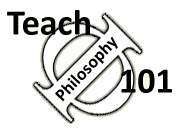Teach Philosophy 101
Free resources for
philosophy teachers!
"One of the most comprehensive, well-researched, and accessible guides for teachers that I have ever seen." James Lang, Chronicle of Higher Education (read full review of TΦ101)
Monte Carlo Quizzes
As we noted earlier, it is often hard to get students to do their reading assignments in a timely fashion unless there is some accountability for whether their assignment is done. A time-honored way to do this is to provide surprise "pop-quizzes" to give students motivation for completing their reading. Peter Fernald has devised a clever version of the surprise quizzes that he calls the "Monte Carlo Quiz" in honor of the famous casinos in Monaco.
The idea is that the instructor distributes in advance six general questions that would apply to any reading assignment. At the beginning of each class a student rolls a die. If the die comes up as 1 or 2, a quiz will be given, if it comes up at 3 or higher, then there is no quiz that day. A second roll of the die indicates which of the predetermined questions will be asked. If there are several different readings, a third roll could indicate the reading that will the subject of the quiz.
For example, the six questions might look like this (these examples are from TΦ101's imagination, not Fernald's article):
-
What is the most important point of the reading?
-
How would you compare this reading assignment to a previous reading assignment in the course?
-
Give an example or real world application of some idea or concept in the assigned reading.
-
Open your book and copy and give the page number for what you thought was the most important sentence in the reading? Why did you think that sentence is so important?
-
What question did you have about the reading or what did you find troubling or disturbing?
-
What was your reaction to the content of the reading?
-
Partial credit if you did not have a chance to read the assignment: what is an important concept you have learned so far in this course?
TΦ10 believes that when you give an in class quiz like this, it is also important to give students an additional partial credit question for those who did not have a chance to do the reading. The point is that if students have nothing to do during the quiz, their eyes are more likely to stray to another paper. If, on the other hand, they can get at least some credit for writing something they will have something to occupy their time.
Source:
Fernald, Peter S., The Monte Carlo Quiz: Encouraging Punctual Completion and Deep Processing of Assigned Readings, College Teaching, 52:3 (2004), pp. 95-99.
Author: John Immerwahr
Update: July 12, 2010
